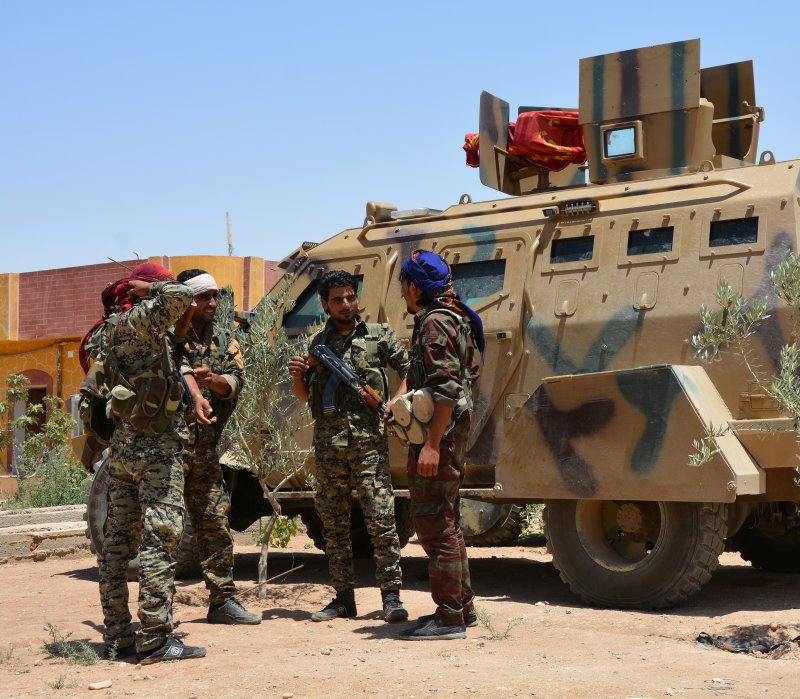Members of the Syrian Democratic Forces gather in the village of Al-Hazeema in northern Raqqa, Syria, on June 6. Photo by Youssef Rabie Youssef/EPA
June 19 (UPI) -- Human rights groups have accused Syrian opposition groups supported by the United States in Syria of having used white phosphorus-loaded munitions in what is appearing to be the final push on the Islamic State's capital of Raqqa.
Videos posted online appear to show -- and human rights groups have claimed -- that white phosphorous munitions were deployed at least twice in densely populated areas of Mosul and Raqqa.
Use of white phosphorus munitions is common in Western militaries, according to military sources, though controversial. White phosphorous shells were used extensively by the Israeli military during the Lebanon invasion in 1982.
Used primarily to create smoke screens to shield advancing infantry and armor, they are also highly effective as incendiary weapons. When a white phosphorus shell explodes, the chemical inside reacts with the air, creating a thick white cloud. When it contacts a person, it can maim and kill by burning to the bone as the phosphorous digs under the skin.
White phosphorus is also used in tracers, illumination rounds and incendiary munitions. Sometimes referred to as WP and the slang term 'Willie Pete" or "Willie Peter," it is a favorite among the military in the field. The term is derived from William Peter, the second world war phonetic alphabet for "WP." As an incendiary weapon, white phosphorus is self-igniting, burns fiercely and can set fire to cloth, fuel, ammunition and other combustibles.
In addition to its offensive capabilities, white phosphorus is a highly efficient smoke-producing agent, which burns quickly and produces an immediate blanket of smoke.
As the final assault on the city of Raqqa begins, Syrian opposition groups supported by the United States have been accused of using white phosphorus artillery shells to produce smoke but the terrible effect on humans concerns outside observers.
With that in mind, it would appear that there really are no good guys in the Syrian war. There are simply bad guys and some who are a little bit or even a whole lot worse. Most of the time what one side accuses the other of doing is being done by both. The accusers are often just as guilty as the accused.
Government forces loyal to Syrian President Bashar al-Assad and the rebels have both deployed weapons banned — or at least frowned upon — by the international community. Both sides have tortured captives and both sides have no respect for the Geneva Conventions.
Treatment of civilians caught in the crossfire leaves much to be desired. The opposition is disunited and some groups are proving to be as ruthless as the government forces.
The Assad regime at one point in the conflict was out-manned, out-gunned and seriously on the brink of collapse but then several things happened reversing the tides of this destructive conflict.
First, Tehran stepped in and dispatched several thousand foot soldiers to help the bewildered government troops. Next, the ayatollahs in Iran asked the Lebanese Hezbollah to assist Damascus and several thousands of highly trained and well-equipped Lebanese Shias were sent in to help. Iran finances and trains Hezbollah's fighters.
The big kicker to the opposition and what saved the regime was Moscow jumping into the fray with the Russian Air Force beginning its air offensive.
Lastly, the Damascus regime began using chemical agents, something Damascus continues to deny but which Western intelligence agencies say they have proof of. Additionally, Damascus used barrel bombs.
Though not in the same destructive and deadly category as biological or chemical weapons, white phosphorous is denounced by human rights groups, which would like to see it banned as a weapon. Don't hold your breath.
This article originally appeared at The Arab Weekly.















